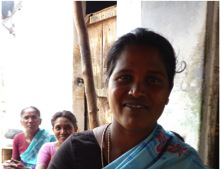 Jillu’s Story
Jillu’s Story
Salt pan workers were one of the first “unreachable groups” SCAD first started working with.
Salt pan work is labour-intensive and those who work in the fields endure extreme physical and economic hardship.
Families are what is termed “bonded labourers” meaning they and their families are permanently indebted to their employers who offer them high interest loans from one season to the next. With low wages and poor living conditions, workers and their families become entrenched in a lifetime of low pay and spiraling debt.
We started working with this community 20 years ago, helping villages to organise themselves to improve living standards for all, and to break the endless cycle of debt and despair.
Children used to start working on the salt pans from the age of seven.
But now primary education is now freely available to all the salt pan workers’ children and there is 96% attendance rate, an increase of 82%.Salt pan worker Jillu is hopeful her three children will face a different future from her parents and grandparents.
She is in a self-help group that regularly saves and borrows money together. This means the women no longer need to take loans out from their employers or loan sharks. Jillu finds she can take care of all of her financial needs within the group.
The women meet once a week in the shade of a tree. They share all their problems and joys together. The group used to take care of an elderly woman in the village before she died and now Jillu wants to take care of two more elders in the village and is currently finding out how she can get a subsidy for her rice before she can afford it.
There are many ways we help a community
Microfinance and educational opportunities are just two examples of the wide range of activities we employ to help make villagers and their villages more self-sufficient. Read more about our approach to community empowerment or watch our film. If you would like to support our community empowerment approach you can donate below.

